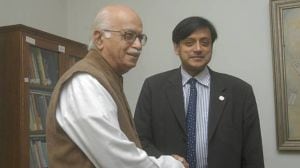Political patter on Gossip Street
At 9.30 pm it begins with a quiet murmur. In the tiny town of Tonk, 100 km south from Jaipur and 100 metres from a clock tower that hasn...

At 9.30 pm it begins with a quiet murmur. In the tiny town of Tonk, 100 km south from Jaipur and 100 metres from a clock tower that hasn’t chimed for the last 15 odd years, the buzz on Kafla Street begins with quite hellos. Rajender Jain starts brewing his ‘sweet and salty’ tea around this time, just as the nightlife in ‘mini Lucknow’ picks up.
Locally they call it the most talkative street in town, where every night hundreds of men gather to gossip. Into the wee hours of the morning, the men of Tonk furiously talk, about everything, from American policy to Indian diplomacy, from the politics of cricket to that of the ballot box. They know everything, have an opinion about everything and say they can’t go to sleep unless they have spent a couple of hours sipping tea, eating boiled eggs, listening to the BBC news and talking.
For the 60 per cent Muslim population of Tonk, most of whom are labourers, the Kafla is a meeting ground. ‘‘After a hard day’s work we come here to catch up on news, from our neighbourhood gossip to world events. We like being updated,’’ says Mumtaz Ahmad, a government employee.
‘‘It’s always been like this,’’ says Jumma Khan, trying hard to remember how it all started. ‘‘I think it was when Tonk’s first Nawab Mir Khan’s Kafila rested here way back during the British Raj. Since then we haven’t been able to stop talking. In fact, even politicians come here to figure out what’s going on.’’
By 10.30 pm, the murmur is replaced by loud chatter as Jain bustles around refilling cups of tea. ‘‘If you come to the Kafla, you have to drink tea,’’ says Ahmad Athar, a dealer in carpets. ‘‘People from Tonk who have settled abroad come all the way to Kafla to drink this tea. It’s special because it has both sugar and salt. Excellent digestive, you know.’’
Once the ground rules of the Kafla have been explained, the focus returns to banter. ‘‘Politics is the flavour of the month,’’ says ice factory owner Mohd. Salim. ‘‘A week back it was cricket. Sometimes it is America but right now, it’s mostly Vajpayee and Sonia.’’
Before they plunge into politics, they explain their demography. While the Muslim voter dominates the Tonk assembly seat, the Bairwa community controls the reserved parliamentary seat. At present the sitting MP from Tonk is BJP man Kailash Meghwal, who is looking for a second term from the same seat.
‘‘Traditionally we are Congress supporters, but there is a marginal shift towards the BJP,’’ admits Ahtar. ‘‘But the bottom line is that neither of them matter because nobody is actually doing anything to better our lives.’’
A more vocal and sarcastic Achan Khan adds: ‘‘Of course India is shining. Till some time back wheat was Rs 7 per kg in Tonk. Today with the grace of God it costs Rs 9.50. Diesel was available at Rs 16 per litre and now it costs Rs 23. Progress, isn’t it?’’
‘‘Basically it is turning out to be a race to see who becomes a crorepati first,’’ quips a voice from the dark. ‘‘The reality of Tonk is that everything has deteriorated. Our watermelons were famous, now they don’t exist. Every evening you would find people roasting corn in the streets, now there are none. Industries have closed down and there are no jobs. We live despite governments.’’
A little further down the one km stretch, they argue about whether Rahul Gandhi entering politics will change the fortunes of the Congress. ‘‘Priyanka would have mattered more,’’ says one voice softly. A louder voice counters him saying: ‘‘Arrey nahin, Rahul Gandhi has revitalised the Congress worker. They’ll win now.’’
‘‘But without an alliance in Uttar Pradesh,’’ the softer voice persists. ‘‘Who needs such allies,’’ barks the other. ‘‘Congress will come to power on its own.’’
And the argument continues. Swinging wildly between Vajpayee’s roads, Sonia’s foreign origin, rath yatras and road shows. More tea is gulped down, more theories added.
And the last word from talking Tonk on communal violence. ‘‘Look, it’s a big country, tragedies happen all the time. Godhra and Gujarat happened. But we have to move on, in anticipation of newer tragedies that will give us something to talk about,’’ says Achun Khan, stroking his beard.



- 01
- 02
- 03
- 04
- 05




























